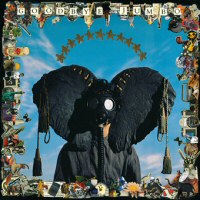Critical reception
Writing for Spin , Jon Young deemed Goodbye Jumbo a "winning opus" and said that frontman Karl Wallinger's "unabashed enthusiasm" and "ability to craft killer pop tunes" prevent the album's liberal referencing of earlier musical styles from becoming "sterile". [13] Chicago Tribune critic Greg Kot considered the album to be heavily influenced by the Beatles' "sense of pop and studio craft", further commenting that the "biting" humour and irony in its lyrics are effectively balanced by upbeat "melodies and moments". [4] Chris Willman of the Los Angeles Times stated that Wallinger's "Lennonisms sound somehow endemic, not affected", and that the album never lapses into "petty theft" despite its numerous influences. [7] In Rolling Stone , Don McLeese wrote that "Goodbye Jumbo displays an ambition as broad as the emotional range of its music", and that while "Wallinger's missionary zeal occasionally belabors his messages", the music "is sufficiently vital to overpower resistance". [11] The Village Voice 's Robert Christgau, however, dismissed the album as a "dud". [14]
At the end of 1990, Goodbye Jumbo was named the year's best album by Q . [15] It was also voted the fifteenth best album of 1990 in The Village Voice's year-end Pazz & Jop critics' poll. [16] At the Grammy Awards' 1991 ceremony, Goodbye Jumbo was nominated for Best Alternative Music Performance. [17] In 2000, it was ranked 94th on Q's list of the "100 Greatest British Albums Ever". [18]
In 2000 it was voted number 474 in Colin Larkin's All Time Top 1000 Albums . [19]
This page is based on this
Wikipedia article Text is available under the
CC BY-SA 4.0 license; additional terms may apply.
Images, videos and audio are available under their respective licenses.
